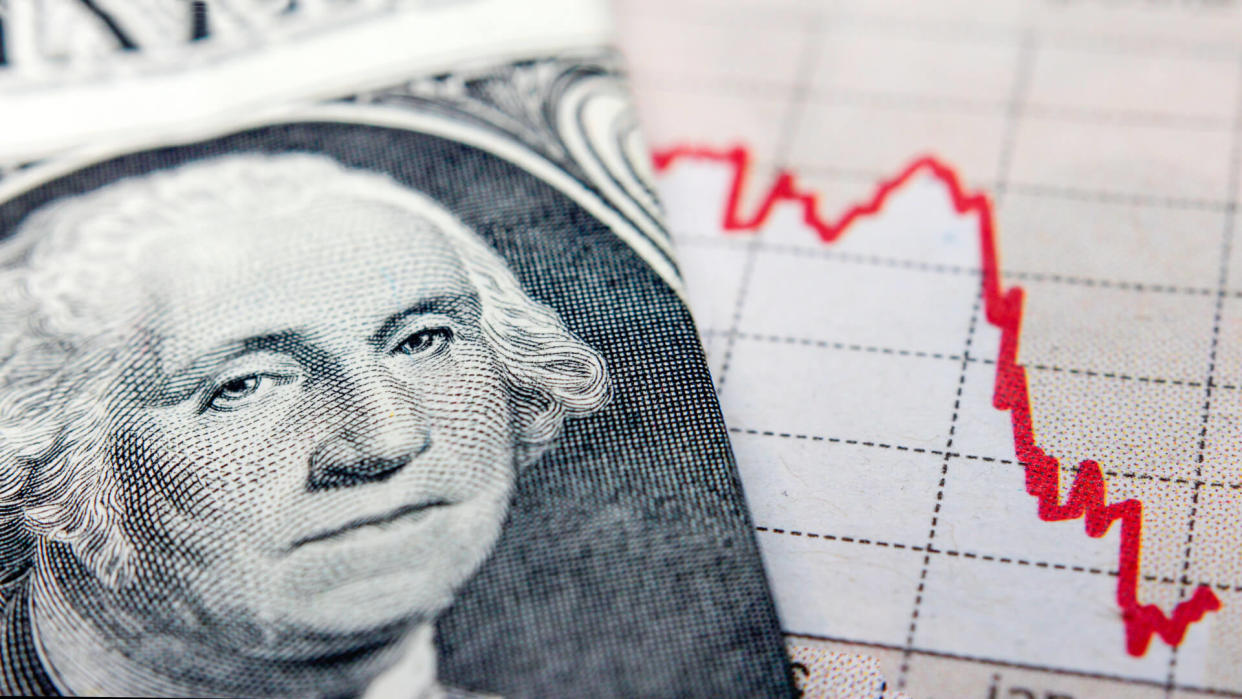6 Ways To Plan Now for a Possible Economic Downturn

Everyone from corporate CEOs and Wall Street investment bankers to financial advisors and regular consumers is on the record as saying that they believe an economic downturn is imminent.
The writing certainly appears to be on the wall.
Find: Surprising Things You Can Buy With Food Stamps
SNAP 2022: Is My State Giving Out Extra EBT Food Stamp Money in June?
Inflation remains near a 40-year high, rising interest rates are cooling economic expansion, the stock market remains deep in the red, and the GDP declined in the first quarter — two quarters in a row is official recession territory.
You can’t do much to change any of that, but there are steps you can take to get yourself as ready as you can be if the economy does take a turn for the worse. Keep reading to see how to protect yourself and your finances from a pending recession that is looking more and more likely every day.
Review Your Monthly Budget for Unnecessary Expenses
Mobile finance tracking apps such as Mint and Simplifi — and probably your bank and credit card providers — use simple charts and other visual aids to reveal the categories that account for most of your monthly spending.
With economic trouble looming on the horizon, it’s now more important than ever to take a moment at the end of each month and look back in your budget for opportunities to trim the fat.
“One of the most effective ways people can cut unnecessary spending is by eating at home,” said Jessica Kats, a budgeting and finance expert at Soxy. “Even if you cut your outside eating by half, you’ll realize you can save a lot of money monthly.”

Consider a Side Gig
Economic downturns bring higher unemployment rates and more people competing for fewer jobs. By building up a side hustle now, you can develop an alternative income stream in case your job becomes a casualty of the next recession — and you can amass a financial cushion while you’re still employed.
“A side hustle can help you to build up your savings,” said Oscar Rodriguez, a financial blogger and founder of OssieRodriguez.com. “When you have extra money coming in from a side hustle, you can funnel it into a savings account or use it to pay down debt. This can leave you in a much better financial position if you encounter an unexpected expense or job loss.”
Apply for a Loan or Extended Credit
With interest rates rising, it’s getting more expensive to borrow money. If you have high-interest credit card debt or other immediate obligations that you don’t have the cash to cover, now might be the time to pursue a loan or extended credit before rates rise again, which they’re expected to throughout 2022.
Sites like Credible let you compare rates from all the major lenders in one place — actual preapprovals, not estimates.
Keep in mind that this tip makes sense only if it’s within your means and doesn’t overextend your finances.
Concentrate on Paying Off Higher-Interest Debt
When things are good and the economy is expanding, experts often recommend the snowball debt repayment method. That’s when you concentrate on paying your smallest debt first to score an easy win, then move up to the next smallest, and so on.
When the market turns south and the economy begins to contract, however, you should reverse course and use the avalanche method. This strategy puts every available dollar into paying down the debt with the highest interest rate while paying only the minimum on all your others — and so on.
This way, you’ll have the most toxic debt under control when the economy does go bad.
“Generally speaking, it is advisable to pay off high-interest debt first, using savings if necessary,” said James Holland, founder of LifePart2.com.
Sell Your Unused Stuff
Yard sales gave generations of people the simultaneous benefits of collecting cash while decluttering — and you can do the same without strangers traipsing around your property at 5 in the morning.
If you have designer or luxury clothing and accessories, give apps such as Poshmark or Tradesy a try. Nextdoor and OfferUp are excellent choices for selling stuff fast to local buyers without having to worry about shipping. Meta Marketplace and CPlus for Craigslist can put your stuff in front of millions of potential buyers from across the country and the world. If you’re offloading a big-ticket item like a pool table, eBay is probably still your best bet.
Search Out Community or Government Resources
If you’re already struggling, some programs and organizations can help you survive the coming downturn. USA.gov is a good place to start looking for them. A website maintained by the federal government, it’s filled with information on finding assistance with paying your rent or mortgage, buying food, paying for broadband, avoiding default on student loans, avoiding homelessness and paying for funerals.
USA.gov also has information on programs like the Supplemental Assistance Nutrition Program (SNAP or food stamps), Medicaid, the Children’s Health Insurance Program (CHIP) and Temporary Assistance for Needy Families (TANF, or welfare).
USA.gov also has a state-by-state list of resources and contacts to help you find aid where you live.
More From GOBankingRates
This article originally appeared on GOBankingRates.com: 6 Ways To Plan Now for a Possible Economic Downturn
